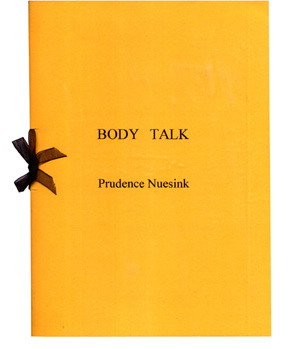|
|
Body Talk – hearing what your body has to tell you – by Prudence Nuesink |
|
Prudence's book, Body Talk, costs just £8.50 (£7.50 plus £1 P&P) and you can buy it by contacing Prudence direct or by emailing or calling FoodsMatter (+44 20 7722 2866) and paying by credit card. However, before doing so, you might like to read Michelle Berriedale-Johnson's 'review' of the book, first published on the Foodsmatter blog in October 2011. |
Many of us subscribe to this belief, in a rather hazy sort of a way, but few of us have really established the connections or learnt the language. Not so Prudence Nuesink, whose little book, Body Talk, I have just read through for the second time. I met Prudence in the lunch queue at the ES-UK conference a few weeks ago and because the dining areas was rather dark (all lights off for the benefits of the electrosensitives) and the sun was shining, we took our lunch outside and sat on the grass to eat it. We discussed leather trousers (she was wearing a pair very similar to the ones I have hanging in a cupboard), the deliciousness of the lunch and our fellow conferees. She then mentioned, in passing, that she had had cancer of the breast, lymph, liver, spine and brain – but that she was now fine. Well, she certainly looked and sounded absolutely fine, to the point that I had been wondering what she was doing at the conference. We talked some more and ended up by driving home together and, when we parted, she gave me a copy of Body Talk. In fifteen months, there was no sign of active cancer in her body. Since then, the cancer has returned twice and on each occasion, she has dealt with it in a similar, and equally successful, way. As her consultant at the Royal Marsden said, Why is it, I now wonder, that I so often have an aching back when sitting at my computer – but, oddly, never when I am playing about with Photoshop and making pictures of food or my garden? Do I deal too much in with words and not enough in concepts and pictures? Does my back recognise this while I ignore it? Or is it that I sit differently when typing and when 'photoshop-ing'? Or is it a combination of the two?
First published in October 2012 |

 It is a long held belief of holistic and complementary therapists that we have lost touch with our bodies – we do not hear what they are trying to tell us, we can no longer decode the signals – and that until we relearn that language, we will never enjoy 'positive' good health.
It is a long held belief of holistic and complementary therapists that we have lost touch with our bodies – we do not hear what they are trying to tell us, we can no longer decode the signals – and that until we relearn that language, we will never enjoy 'positive' good health. 










